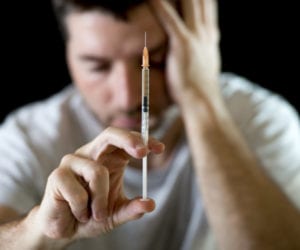Signs and Symptoms of Heroin Addiction

Heroin Addiction – Symptoms, Signs and Side Effects
From city to suburb, the wave of deadly heroin blends continues to make headlines. The duplicitous shift to these potent cocktails coincides with the persistent demand for a cheaper alternative for those trapped in addiction to costly prescription drugs. Already a difficult habit to kick, the ease of falling into heroin addiction paired with the heightened potential for overdose seriously ramp up the risks for people struggling with addiction to this drug.
Another big concern expressed by scientist at the National Institute on Drug Abuse (NIDA) is that tolerance levels for these ‘super’ heroin substances naturally increases with each use. Habituated heroin abuse eventually wreaks havoc on the individual, their loved ones and the community as it alters brain functions and displace rational filters. Since consumers are often unaware of the composition of adulterated street heroin that is laced with drugs like fentanyl, it is easy for them to underestimate the potency of the dose. One way to help yourself or a loved one heading into or has already become trapped into a heroin abuse lifestyle is to understand the range of symptoms that are associated with heroin abuse.
Symptoms of Heroin Use or Abuse
The symptoms of heroin use can closely mimic other powerful drugs. Loved ones unfamiliar with the symptoms of heroin use or abuse may overlook or explain them away as they manifest. Unfortunately, when it comes to heroin, delay can be fatal. Recognizing and addressing the symptoms of heroin abuse at the onset is the most effective way to prevent, what very frequently becomes, a serious drug problem. And, it is also important to recognize that people that have developed a craving for this drug may also be in denial. Don’t be surprised if they reject any attempt in discussing the problem or suggestions to stop using the drug. Typically, a carefully planned and executed drug intervention is the most effective way of helping them to kick the habit.
An obvious symptom of heroin use is a noticeable shift in lifestyle priorities that may manifest in innumerable ways. If the following symptoms have become evident in a loved one, it may be possible that they are at risk of full-fledged addiction to heroin.
- A growing urge to use heroin on a regular basis.
- Needing to increase the dose to get the same effect.
- Concerns about being able to get the drug.
- Failing to meet family, school or work obligations because of drug use.
- Contemplating or actually doing things to get the drug that is out of character for you.
- Taking risks while under the influence of heroin such as driving or caring for children.
- Becoming more preoccupied with getting and using heroin.
- Have had one or more failed attempts to stop drug use.
- Experiencing physical discomfort or “withdrawal symptoms” during attempts to stop or reduce the amount of heroin being taken.
- Neglecting personal hygiene
- Getting into financial problems in order to support the heroin habit.
Visible signs when heroin is in use may include:
- Shallow breathing
- Pinpoint pupils
- Drowsiness
- Flushed skin
Pay attention to the following heroin side effects which, in some instances, may prove to be fatal if medical attention is not received in a timely manner. The most harmful side effects of heroin use recognized by the National Institute on Drug Abuse include:
- Accidental overdose that is typically evidenced by lowered body temperature, miotic or constricted pupils, falling in and out of consciousness, cyanotic or bluish lips, hands and feet, cold and clammy skin. These symptoms may require immediate emergency medical attention to prevent death.
- Severe depression that has the potential to lead to attempted or completed suicide.
- Spontaneous abortion in Pregnant Women.
- Development of adverse health conditions such as abscesses, collapsed veins, heart disease, Hepatitis C, HIV/AIDS, and pulmonary Noticeable shift in lifestyle priorities that may manifest as a withdrawal normal daily activities
It is important to recognize that treatment for habituated heroin addiction must be comprehensive if it is to be effective. The treatment process begins with halting drug use which may occur abruptly or through a gradual process of detoxification. Once withdrawal symptoms are stabilized, treatment may include a course of physical and psychological care that is focused on achieving long term sobriety.
The signs of heroin use should always be taken seriously. Confronting the individual about their drug use should be done with compassion and without judgement. Even if heroin use has just begun, it will be beneficial for the heroin user to seek counsel to address underlying issues that may be driving drug use.
If you or a loved one needs help with abuse and/or treatment, please call the WhiteSands Treatment at (877) 855-3470. Our addiction specialists can assess your recovery needs and help you get the addiction treatment that provides the best chance for your long-term recovery.
